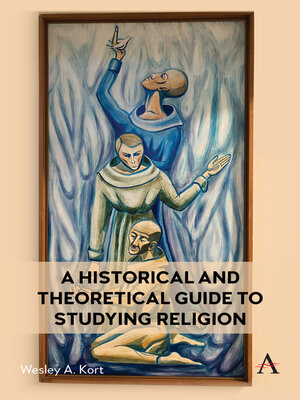A Historical and Theoretical Guide to Studying Religion
ebook ∣ Anthem Religion and Society
By Wesley Kort

Sign up to save your library
With an OverDrive account, you can save your favorite libraries for at-a-glance information about availability. Find out more about OverDrive accounts.
Find this title in Libby, the library reading app by OverDrive.



Search for a digital library with this title
Title found at these libraries:
| Library Name | Distance |
|---|---|
| Loading... |
This book, a guide to studying religion, has two parts. The first or historical part traces the rise of the academic study of religion from the early nineteenth century to the present day. Primary attention is given to the relation of studying religion to Romanticism and to its contrary relations to principal characteristics of Western modernity, especially its rational and materialist emphases. The second part of the book addresses matters that present uncertainties, problems, and even tensions within the field, such as, what is or should be meant by referring to some persons or groups as religious, why religion is so often a cause of tensions and even conflicts both within and between religious groups and between them and the increasingly nonreligious or secular quality of modern Western culture, and the problem that arises for the field by reason of scholars who, on one side, are themselves religious and who, on the other side, are nonreligious or secular. The book places this final difficulty, the difference and often the tension between religious and nonreligious approaches to the study of religion, in the role of a unifying theme of the book and offers a way by which this problem can be addressed and to a considerable degree reduced.
|The book has two, related parts: the first historical and the second theoretical. The first part traces the beginning of "religious studies," as it now increasingly is called, to the early nineteenth century. It places those beginnings in the broader cultural context of what is generally referred to as Romanticism. A case is made that the principal relations between the origins of religious studies and Romanticism is that both arise as reactions to major characteristics of modern culture, primarily the turn of attention away from the past and toward the future and from textuality toward rationality and materiality, including the separation of the two from one another.
The first or historical half of the book is structured by three recurring and enduring interests in religion by scholars, mainly working in the social or human sciences, including history, that are shared during the period and continue, albeit in more complex and varied forms, today. The first of these three interests is the importance for religious people of the past and its continuing relevance to their present and future. This interest and evaluation of the past and origins is, either directly or implicitly, contrasted to Western modernity's orientation to the future and neglect and devaluing of the past. The second interest or focus is on the emphasis among religious people on the intangible or spiritual in human lives and cultures. This interest is, either directly or by implication, a reaction to the importance in modernity that is ascribed to the tangible and material. The third interest taken by scholars in the cultures of religious societies is the adequacy and coherence of worldviews that they provide, which stand in contrast to the lack in modern culture of worldviews that have a comparable degree of coherence and adequacy. These three interests are treated by including for each of them brief sketches of the work of five scholars arranged in chronological order. The conclusion drawn from these surveys of fifteen scholars from the beginning of the nineteenth century and into the twentieth century, most of whom were working in the social or human sciences, is that they shared an interest in human needs, potentials, and well being and a recognition that in various ways and to varying degrees modern culture is questionable due to its inability to provide what can be seen as an active aspect of religiously constituted cultures, particularly those of...







